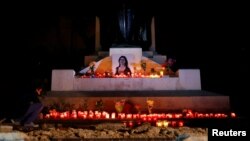The Mediterranean island nation of Malta needs better checks and balances, with the prime minister's powers currently eclipsing other institutions, experts from Europe's top human rights body said Friday.
The critical assessment issued by the Council of Europe's advisory body — known as the Venice Commission and comprised of legal experts — comes as Malta's institutions are under increasing fire following Panama Papers revelations involving a government minister and the murder of a journalist investigating government corruption.
The experts recommended strengthening the role of the president; increasing salaries of parliamentarians so they can focus on legislative work; reducing the prime minister's powers to make appointments; changing the way judicial vacancies are filled; and abolishing the double role of attorney general as both government adviser and prosecutor.
A minister in Prime Minister Joseph Muscat's Labour government lost his post in 2016 due to revelations that he opened a company in Panama, but there has been no police investigation despite public pressure. Also, calls for the police commissioner's resignation follow the murder of journalist Daphne Caruana Galizia in October 2017 have gone unanswered.
The imbalance in Malta's institutions has been a topic at the European Parliament.
The Venice Commission said that the power of the prime minister "widely overshadows other government bodies, including the president, parliament, cabinet of ministers, judiciary and ombudsman." It also found that paying parliamentarians part-time salaries harmed their ability to operate independently from the prime minister's office, and that the president did not have sufficient powers to provide checks and balances.
The experts, who visited Malta last month, said that the prime minister wields considerable influence over judicial appointments, and that the imbalance "is accentuated by the weakness of civil society and independent media."
They cited the murder of Caruana Galizia, who was investigating corruption and money-laundering. While the Commission said it is beyond its mandate to examine the truth of the allegations in Caruana Galizia's reporting, it stressed Malta's obligation to ensure that media and civil society "play unencumbered and active roles in holding authorities accountable."
The experts praised recent judicial reform as a step in the right direction but said it remained insufficient.




